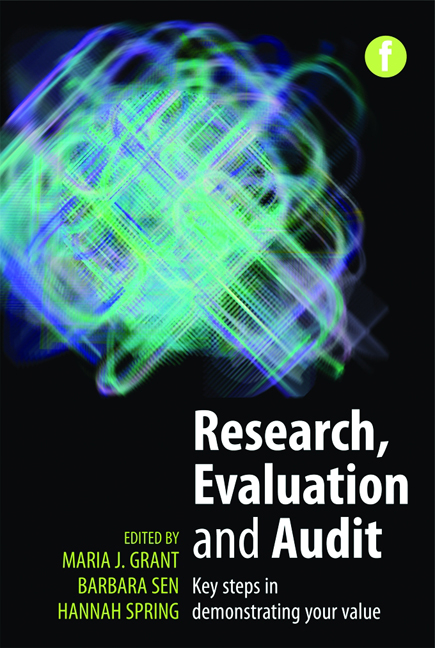Book contents
- Frontmatter
- Contents
- About the Editors
- Contributor
- Foreword
- Preface
- PART 1 GETTING STARTED
- PART 2 DOING RESEARCH, EVALUATION AND AUDIT
- 6 Reviewing the literature
- 7 Qualitative approaches
- 8 Quantitative approaches
- 9 Data analysis
- 10 Tools to facilitate your project
- PART 3 IMPACT OF RESEARCH, EVALUATION AND AUDIT
- Closing remarks
- Index
10 - Tools to facilitate your project
from PART 2 - DOING RESEARCH, EVALUATION AND AUDIT
Published online by Cambridge University Press: 08 June 2018
- Frontmatter
- Contents
- About the Editors
- Contributor
- Foreword
- Preface
- PART 1 GETTING STARTED
- PART 2 DOING RESEARCH, EVALUATION AND AUDIT
- 6 Reviewing the literature
- 7 Qualitative approaches
- 8 Quantitative approaches
- 9 Data analysis
- 10 Tools to facilitate your project
- PART 3 IMPACT OF RESEARCH, EVALUATION AND AUDIT
- Closing remarks
- Index
Summary
‘I feel completely overwhelmed by the amount of “information” I've gathered. Help!’
‘What tools are out there to help me manage all this data?’
‘How can I keep track of what's going on in the wider LIS community?’
When doing a project, whether it's research, evaluation or audit, you can often feel overwhelmed by the amount of information generated and, particularly when you are new to project work, it can be difficult to know where to turn for support. The good news is that there are lots of tools and networks available to help you.
This chapter moves through the resources and tools available at each stage of the research, evaluation and audit process, discussing reference management software, concept mapping, alert services, RSS readers. Some of the more commonly used tools available are listed in each section. These are provided purely for illustration purposes and are not intended as recommendations.
Reference management software and associated Applications
For many of us, literature searching is an integral part of the service we provide as part of our day today practice. The end point for this service often manifests itself as a printed list of references or, more commonly, a file of downloaded references for the service user to manage, appraise and analyse. Like our service users, when using literature to inform our own practice we can employ tools to assist the management and manipulation of the literature. These can include reference management software packages and concept mapping tools, sometimes referred to as mind mapping.
Reference management software
Reference management software, also known as citation management software, enables you to upload records and keep track of the records you've found through your database searches. Each document listed in the database search results is given its own record within the software, usually with a notes field so that you can annotate the record in terms of its usefulness and relationship to the themes you've identified in the literature.
- Type
- Chapter
- Information
- Research, Evaluation and AuditKey steps in demonstrating your value, pp. 177 - 188Publisher: FacetPrint publication year: 2013



